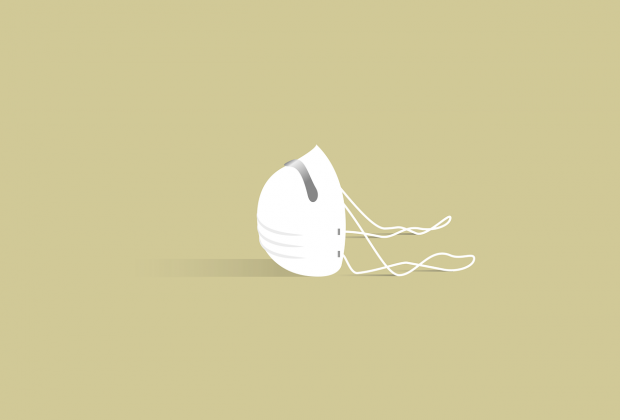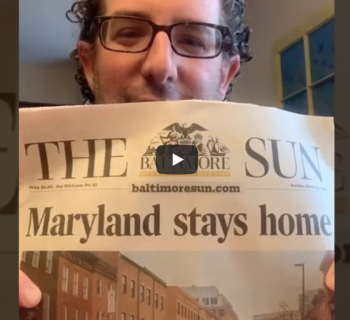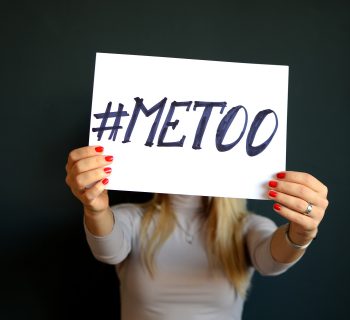*Articles reflect the views of the author and/or those quoted and do not necessarily represent the views of CCBC or The CCBC Connection.
Sean Knox
Coronavirus is everywhere these days, both literally and figuratively. Officially known as COVID-19 (novel coronavirus disease 2019), talk of coronavirus fills our news headlines and social media feeds while the virus itself continues to spread across countries all over the world.
Many aspects of COVID-19 are still poorly understood, forcing governments to focus on slowing the spread of the virus while scientists race to develop effective treatments and vaccines*. In the United States, residents of almost 40 states are now officially under “stay-at-home” orders, typically requiring people to stay inside apart from essential activities like buying groceries or getting basic physical exercise. Maryland joined the list after adopting a statewide stay-at-home declaration that began on March 30.
While most people have come around to accepting the severity of the threat and the need for restrictions and changes to daily behaviors, there are still those who would argue against coronavirus-related limitations.
In recent weeks, there have been reports that people in multiple states, including Maryland, have hosted so-called “coronavirus parties” despite standing orders that prohibit group gatherings**. Sometimes the parties are attended by people in their teens or twenties, age ranges that were originally believed to be safe from the most severe symptoms of coronavirus, but others are held by people who simply don’t think coronavirus is a big deal and don’t like being told what to do. Some critics have also argued that the reaction to coronavirus is excessive, that some of the announced recommendations are unnecessary and panic-driven and don’t need to be taken seriously.
Let’s be clear: coronavirus parties are a terrible idea. Yes, parties are a great way to have fun, relieve stress, or even to protest something you don’t agree with, but we have to think differently when it comes to coronavirus.
While there’s still much we don’t understand about COVID-19, we do know that it is highly contagious, spreading easily at close range. We’re all still learning about the variety of potential symptoms and complications caused by the virus, but it’s well known that a certain percentage of people who become infected remain asymptomatic or only mildly symptomatic; these people can still spread the virus without ever realizing that they’ve been infected. Those two facts alone make coronavirus parties or other gatherings both dangerous and selfish.
It’s important to point out that young people are not invincible against this disease: check your Twitter feed and search hashtags related to COVID-19, and you will read accounts of people in their twenties and thirties who have been put on ventilators, have been placed in medically-induced comas, or have died. These are people who were young and described as being in perfectly good health. While many young and healthy people will survive the effects of coronavirus and be able to handle the symptoms, some won’t.
For those that do survive, including all the people who have either minimal symptoms or no symptoms at all, you can still easily spread the virus to those around you while you’re infected. Aside from the risk to healthy people, coronavirus is particularly dangerous for people who are older, have compromised immune systems, or are dealing with chronic illnesses. Most of us have one or more of these people in our lives: older relatives, friends or family members battling cancer, or even people who have anything from an autoimmune disease to something as common as asthma. Every single one of them has a higher risk of experiencing more severe symptoms and complications from coronavirus.
I fully understand that the reaction to coronavirus can seem excessive. This is something the likes of which most of us have never seen in our lifetime, and that makes it hard to see the big picture and the importance of even small actions. Recommendations like avoiding touching our faces, maintaining at least 6 feet of separation from other people, and washing our hands frequently (for no less than 20 seconds) can seem tedious. I can personally attest to the fact that, prior to the past few weeks, I have seldom paid attention to how long I was washing my hands or how often I was touching my face throughout the day. Following the current recommendations has involved the recurring annoyance of constantly reminding myself to do or not do something.
For most people, including college students, staying in and avoiding gatherings also just gets old. There are only so many Netflix shows a person can binge at one time, and soon you begin to miss spending time with family and friends and you long for the “normalcy” of life pre-coronavirus. It’s easy to become complacent: to get tired of washing your hands one more time, or to start thinking that one night of hanging out with a few friends can’t be that serious as long as everyone says they’re feeling fine beforehand. But we can’t afford to think that way right now.
If you aren’t too worried about coronavirus personally, please think about all the people around you whose lives could be severely affected by your actions and decisions. While we wait for labs to develop vaccines and for scientists to learn more about the nature of COVID-19, avoiding gatherings of people - even friends and nearby family - and practicing recommended social distancing habits will be key in slowing the rate of infection. Our choices and actions in the coming weeks and months will determine the effectiveness of our response against coronavirus both here in Maryland and the United States as a whole.
By slowing the rate of infections, we will not only give labs and scientists the time they need, but we can keep hospitals and hospital staff from being overwhelmed by more sick people than they’re able to safely and adequately care for. It’s been widely reported in the past few weeks, but most hospitals lack sufficient equipment (ventilators, testing supplies, etc.) and protective gear (N95 masks, protective visors, gowns, etc.) to handle increasing numbers of patients. By following guidelines and restrictions, we not only keep ourselves and our loved ones safe, but we’ll be helping to take care of the doctors, nurses, and hospital staff that we’ll be relying on to save and care for as many people as possible.
During Maryland’s stay-at-home order it’s also important to take care of yourself. Just because you need to physically distance yourself from others doesn’t mean you need to become isolated. Call and video chat with friends and family as often as needed and be creative with finding ways to stay connected with your loved ones and the world around you. If you haven’t already, stock up on the food and supplies you’ll need for the next two to four weeks. Don’t take more than you need, but don’t feel like it’s wrong to have food and supplies on-hand.
Make a point to exercise and get outside when you can. You should still maintain at least the recommended 6 feet of distance between yourself and the people around you, but getting outside can help to remind you that the world’s still there, that sunshine (or rain) still feels good and that the birds are still singing.
If you’re feeling overwhelmed by the constant barrage of coronavirus details on the news and social media, set it all aside and give yourself a break. Read a book, walk your dog, call a friend and talk about “Love is Blind” or “Tiger King.” It’s important to take coronavirus very seriously and to respect what it can do, but we also have to remember to take care of ourselves along the way.
It feels like we’re all waiting with this expectation that soon everything will get “back to normal” and be exactly like it was before COVID-19, but there’s no way to know when or if that will ever fully happen. Our definition of normal may ultimately change in small or not-so-small ways. But regardless of what life looks like after we get a handle on coronavirus - and we will get a handle on it eventually - we’ll adapt and come together and move forward. Restrictions will be relaxed or rescinded, in-person classes will resume, and parties will return.
In the meantime, keep in touch with loved ones and stay connected. Listen to experts like Dr. Anthony Fauci and Dr. Deborah Birx. Follow recommendations from the State of Maryland and the Center for Disease Control. Remind people around you to do the same, and remember that we will get through this.
And wash your hands.
*At the time of writing, there are more than 976,000 confirmed cases worldwide with more than 50,000 deaths. There are over 239,000 confirmed cases and 5,400 deaths in the United States alone, with 2,758 cases and 42 deaths currently confirmed in Maryland.
**At the time of writing, Maryland allows gatherings of no more than 10 people, all of whom must maintain at least 6 feet of physical separation.
*Articles reflect the views of the author and/or those quoted and do not necessarily represent the views of CCBC or The CCBC Connection.















I can’t believe that we even have to have this conversation about how to take care of ourselves and others. Growing up you were taught to wash your hands, cover your mouth, and keep a distance from people, especially strangers. Today for some reason, we are looking for guidance from a group of strangers who hold political office on how to protect ourselves. Even if you are told not to wear a mask, why would anyone listen? This question has me baffled! I also can’t come to grips with the fact that as wealthy this country is, we can’t get our hands on the much need medical supplies our hospitals need. I did learn one thing about this country, every thing and I mean every thing is political – down to who gets what medical equipment and who doesn’t get.
Oneimportant part of Covid 19 that this article left out is that it remaines infectious for up to 24 hours on cardboard and four hours on copper. The virus was detectable in aerosols for up to three hours. These times will vary under real-world conditions, depending on factors including temperature, humidity, ventilation, and the amount of virus deposited.
With all of the unknowns about Corona virus and how it seems to effect people differently, I think people should avoid extending their social circles and adhere to social distancing recommendations. Stay safe and stay healthy!